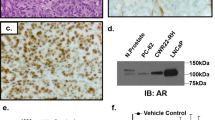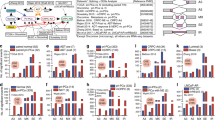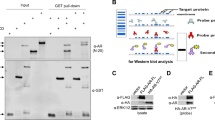Abstract
Reactivation of the androgen receptor (AR) during androgen depletion therapy (ADT) underlies castration-resistant prostate cancer (CRPCa). Alternative splicing of the AR gene and synthesis of constitutively active COOH-terminally truncated AR variants lacking the AR ligand-binding domain has emerged as an important mechanism of ADT resistance in CRPCa. In a previous study, we demonstrated that altered AR splicing in CRPCa 22Rv1 cells was linked to a 35-kb intragenic tandem duplication of AR exon 3 and flanking sequences. In this study, we demonstrate that complex patterns of AR gene copy number imbalances occur in PCa cell lines, xenografts and clinical specimens. To investigate whether these copy number imbalances reflect AR gene rearrangements that could be linked to splicing disruptions, we carried out a detailed analysis of AR gene structure in the LuCaP 86.2 and CWR-R1 models of CRPCa. By deletion-spanning PCR, we discovered a 8579-bp deletion of AR exons 5, 6 and 7 in the LuCaP 86.2 xenograft, which provides a rational explanation for synthesis of the truncated AR v567es AR variant in this model. Similarly, targeted resequencing of the AR gene in CWR-R1 cells led to the discovery of a 48-kb deletion in AR intron 1. This intragenic deletion marked a specific CWR-R1 cell population with enhanced expression of the truncated AR-V7/AR3 variant, a high level of androgen-independent AR transcriptional activity and rapid androgen independent growth. Together, these data demonstrate that structural alterations in the AR gene are linked to stable gain-of-function splicing alterations in CRPCa.
This is a preview of subscription content, access via your institution
Access options
Subscribe to this journal
Receive 50 print issues and online access
$259.00 per year
only $5.18 per issue
Buy this article
- Purchase on Springer Link
- Instant access to full article PDF
Prices may be subject to local taxes which are calculated during checkout







Similar content being viewed by others
References
Chen Y, Clegg NJ, Scher HI . Anti-androgens and androgen-depleting therapies in prostate cancer: new agents for an established target. Lancet Oncol 2009; 10: 981–991.
Heemers HV, Tindall DJ . Androgen receptor (AR) coregulators: a diversity of functions converging on and regulating the AR transcriptional complex. Endocr Rev 2007; 28: 778–808.
Scher HI, Sawyers CL . Biology of progressive, castration-resistant prostate cancer: directed therapies targeting the androgen-receptor signaling axis. J Clin Oncol 2005; 23: 8253–8261.
Taplin ME . Drug insight: role of the androgen receptor in the development and progression of prostate cancer. Nat Clin Pract Oncol 2007; 4: 236–244.
Attard G, Swennenhuis JF, Olmos D, Reid AH, Vickers E, A’Hern R et al. Characterization of ERG, AR and PTEN gene status in circulating tumor cells from patients with castration-resistant prostate cancer. Cancer Res 2009; 69: 2912–2918.
Chen CD, Welsbie DS, Tran C, Baek SH, Chen R, Vessella R et al. Molecular determinants of resistance to antiandrogen therapy. Nat Med 2004; 10: 33–39.
Edwards J, Krishna NS, Grigor KM, Bartlett JM . Androgen receptor gene amplification and protein expression in hormone refractory prostate cancer. Br J Cancer 2003; 89: 552–556.
Ford 3rd OH, Gregory CW, Kim D, Smitherman AB, Mohler JL . Androgen receptor gene amplification and protein expression in recurrent prostate cancer. J Urol 2003; 170: 1817–1821.
Linja MJ, Savinainen KJ, Saramaki OR, Tammela TL, Vessella RL, Visakorpi T . Amplification and overexpression of androgen receptor gene in hormone-refractory prostate cancer. Cancer Res 2001; 61: 3550–3555.
Liu W, Laitinen S, Khan S, Vihinen M, Kowalski J, Yu G et al. Copy number analysis indicates monoclonal origin of lethal metastatic prostate cancer. Nat Med 2009; 15: 559–565.
Visakorpi T, Hyytinen E, Koivisto P, Tanner M, Keinanen R, Palmberg C et al. In vivo amplification of the androgen receptor gene and progression of human prostate cancer. Nat Genet 1995; 9: 401–406.
Leversha MA, Han J, Asgari Z, Danila DC, Lin O, Gonzalez-Espinoza R et al. Fluorescence in situ hybridization analysis of circulating tumor cells in metastatic prostate cancer. Clin Cancer Res 2009; 15: 2091–2097.
Haapala K, Hyytinen ER, Roiha M, Laurila M, Rantala I, Helin HJ et al. Androgen receptor alterations in prostate cancer relapsed during a combined androgen blockade by orchiectomy and bicalutamide. Lab Invest 2001; 81: 1647–1651.
Hyytinen ER, Haapala K, Thompson J, Lappalainen I, Roiha M, Rantala I et al. Pattern of somatic androgen receptor gene mutations in patients with hormone-refractory prostate cancer. Lab Invest 2002; 82: 1591–1598.
Steinkamp MP, O’Mahony OA, Brogley M, Rehman H, Lapensee EW, Dhanasekaran S et al. Treatment-dependent androgen receptor mutations in prostate cancer exploit multiple mechanisms to evade therapy. Cancer Res 2009; 69: 4434–4442.
Taplin ME, Bubley GJ, Ko YJ, Small EJ, Upton M, Rajeshkumar B et al. Selection for androgen receptor mutations in prostate cancers treated with androgen antagonist. Cancer Res 1999; 59: 2511–2515.
Taplin ME, Bubley GJ, Shuster TD, Frantz ME, Spooner AE, Ogata GK et al. Mutation of the androgen-receptor gene in metastatic androgen-independent prostate cancer. N Engl J Med 1995; 332: 1393–1398.
Taplin ME, Rajeshkumar B, Halabi S, Werner CP, Woda BA, Picus J et al. Androgen receptor mutations in androgen-independent prostate cancer: Cancer and Leukemia Group B Study 9663. J Clin Oncol 2003; 21: 2673–2678.
Thompson J, Hyytinen ER, Haapala K, Rantala I, Helin HJ, Janne OA et al. Androgen receptor mutations in high-grade prostate cancer before hormonal therapy. Lab Invest 2003; 83: 1709–1713.
Tilley WD, Wilson CM, Marcelli M, McPhaul MJ . Androgen receptor gene expression in human prostate carcinoma cell lines. Cancer Res 1990; 50: 5382–5386.
Mohler JL, Gregory CW, Ford 3rd OH, Kim D, Weaver CM, Petrusz P et al. The androgen axis in recurrent prostate cancer. Clin Cancer Res 2004; 10: 440–448.
Montgomery RB, Mostaghel EA, Vessella R, Hess DL, Kalhorn TF, Higano CS et al. Maintenance of intratumoral androgens in metastatic prostate cancer: a mechanism for castration-resistant tumor growth. Cancer Res 2008; 68: 4447–4454.
Locke JA, Guns ES, Lubik AA, Adomat HH, Hendy SC, Wood CA et al. Androgen levels increase by intratumoral de novo steroidogenesis during progression of castration-resistant prostate cancer. Cancer Res 2008; 68: 6407–6415.
Mohler JL, Titus MA, Bai S, Kennerley BJ, Lih FB, Tomer KB et al. Activation of the androgen receptor by intratumoral bioconversion of androstanediol to dihydrotestosterone in prostate cancer. Cancer Res 2011; 71: 1486–1496.
Attard G, Richards J, de Bono JS . New strategies in metastatic prostate cancer: targeting the androgen receptor signaling pathway. Clin Cancer Res 2011; 17: 1649–1657.
de Bono JS, Logothetis CJ, Molina A, Fizazi K, North S, Chu L et al. Abiraterone and increased survival in metastatic prostate cancer. N Engl J Med 2011; 364: 1995–2005.
Dehm SM, Schmidt LJ, Heemers HV, Vessella RL, Tindall DJ . Splicing of a novel androgen receptor exon generates a constitutively active androgen receptor that mediates prostate cancer therapy resistance. Cancer Res 2008; 68: 5469–5477.
Guo Z, Yang X, Sun F, Jiang R, Linn DE, Chen H et al. A novel androgen receptor splice variant is up-regulated during prostate cancer progression and promotes androgen depletion-resistant growth. Cancer Res 2009; 69: 2305–2313.
Hu R, Dunn TA, Wei S, Isharwal S, Veltri RW, Humphreys E et al. Ligand-independent androgen receptor variants derived from splicing of cryptic exons signify hormone-refractory prostate cancer. Cancer Res 2009; 69: 16–22.
Sun S, Sprenger CC, Vessella RL, Haugk K, Soriano K, Mostaghel EA et al. Castration resistance in human prostate cancer is conferred by a frequently occurring androgen receptor splice variant. J Clin Invest 2010; 120: 2715–2730.
Watson PA, Chen YF, Balbas MD, Wongvipat J, Socci ND, Viale A et al. Constitutively active androgen receptor splice variants expressed in castration-resistant prostate cancer require full-length androgen receptor. Proc Natl Acad Sci USA 2010; 107: 16759–16765.
Hornberg E, Ylitalo EB, Crnalic S, Antti H, Stattin P, Widmark A et al. Expression of androgen receptor splice variants in prostate cancer bone metastases is associated with castration-resistance and short survival. PLoS One 2011; 6: e19059.
Li Y, Alsagabi M, Fan D, Bova GS, Tewfik AH, Dehm SM . Intragenic rearrangement and altered RNA splicing of the androgen receptor in a cell-based model of prostate cancer progression. Cancer Res 2011; 71: 2108–2117.
Tarailo-Graovac M, Chen N . Using RepeatMasker to identify repetitive elements in genomic sequences. Curr Protoc Bioinformatics 2009. Chapter 4: Unit 4 10..
Quinlan AR, Clark RA, Sokolova S, Leibowitz ML, Zhang Y, Hurles ME et al. Genome-wide mapping and assembly of structural variant breakpoints in the mouse genome. Genome Res 2010; 20: 623–635.
Gottlieb B, Beitel LK, Wu JH, Trifiro M . The androgen receptor gene mutations database (ARDB): 2004 update. Hum Mutat 2004; 23: 527–533.
Berger MF, Lawrence MS, Demichelis F, Drier Y, Cibulskis K, Sivachenko AY et al. The genomic complexity of primary human prostate cancer. Nature 2011; 470: 214–220.
Robbins CM, Tembe WA, Baker A, Sinari S, Moses TY, Beckstrom-Sternberg S et al. Copy number and targeted mutational analysis reveals novel somatic events in metastatic prostate tumors. Genome Res 2011; 21: 47–55.
Corey E, Quinn JE, Buhler KR, Nelson PS, Macoska JA, True LD et al. LuCaP 35: a new model of prostate cancer progression to androgen independence. Prostate 2003; 55: 239–246.
Roudier MP, True LD, Higano CS, Vesselle H, Ellis W, Lange P et al. Phenotypic heterogeneity of end-stage prostate carcinoma metastatic to bone. Hum Pathol 2003; 34: 646–653.
Dagvadorj A, Tan SH, Liao Z, Cavalli LR, Haddad BR, Nevalainen MT . Androgen-regulated and highly tumorigenic human prostate cancer cell line established from a transplantable primary CWR22 tumor. Clin Cancer Res 2008; 14: 6062–6072.
Gregory CW, Johnson Jr RT, Mohler JL, French FS, Wilson EM . Androgen receptor stabilization in recurrent prostate cancer is associated with hypersensitivity to low androgen. Cancer Res 2001; 61: 2892–2898.
Acknowledgements
We are grateful to the Minnesota Supercomputing Institute and the Masonic Cancer Center Biostatistics and Bioinformatics Core for providing computing, bioinformatics, statistical, software and data storage support for this project. Cytogenetic analyses were performed in the Cytogenetics Shared Resource Laboratory at the University of Minnesota, with support from the comprehensive Masonic Cancer Center NIH Grant P30 CA077598. We thank Amanda Hemmingsen Jaeger for assistance with developing MLPA for AR gene structure analysis. SMD is a Masonic Scholar of the Masonic Cancer Center, University of Minnesota. This work was supported by a Young Investigator Award from the Prostate Cancer Foundation (SMD), DOD New Investigator Award PC094384 (SMD) NCI Grant CA141011 (SMD), and a seed grant from the Institute of Human Genetics, University of Minnesota.
Author information
Authors and Affiliations
Corresponding author
Ethics declarations
Competing interests
The authors declare no conflict of interest.
Additional information
Supplementary Information accompanies the paper on the Oncogene website
Supplementary information
Rights and permissions
About this article
Cite this article
Li, Y., Hwang, T., Oseth, L. et al. AR intragenic deletions linked to androgen receptor splice variant expression and activity in models of prostate cancer progression. Oncogene 31, 4759–4767 (2012). https://doi.org/10.1038/onc.2011.637
Received:
Revised:
Accepted:
Published:
Issue Date:
DOI: https://doi.org/10.1038/onc.2011.637
Keywords
This article is cited by
-
PROTAC’ing oncoproteins: targeted protein degradation for cancer therapy
Molecular Cancer (2023)
-
Preclinical models of prostate cancer — modelling androgen dependency and castration resistance in vitro, ex vivo and in vivo
Nature Reviews Urology (2023)
-
Second generation androgen receptor antagonists and challenges in prostate cancer treatment
Cell Death & Disease (2022)
-
Targeting a splicing-mediated drug resistance mechanism in prostate cancer by inhibiting transcriptional regulation by PKCβ1
Oncogene (2022)
-
Androprostamine A: a unique antiprostate cancer agent
The Journal of Antibiotics (2021)



